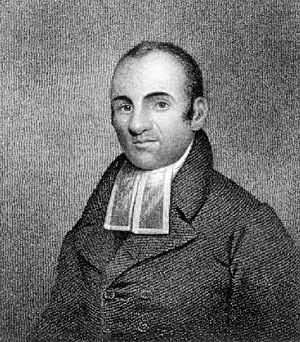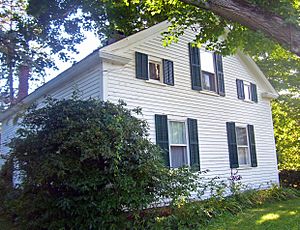Lemuel Haynes facts for kids
Quick facts for kids
Lemuel Haynes
|
|
|---|---|

Frontispiece of 1837's Sketches of the Life and Character of the Rev. Lemuel Haynes, A.M.
|
|
| Born | July 18, 1753 |
| Died | September 28, 1833 (aged 80) South Granville, New York, U.S.
|
| Resting place | Lee-Oatman Cemetery, South Granville, New York, U.S. |
| Nationality | American |
| Occupation | Congregational minister |
| Years active | 1780-1833 |
| Known for | The first credentialed African-American clergyman in the United States |
Lemuel Haynes (born July 18, 1753 – died September 28, 1833) was an important American religious leader. He fought in the American Revolution, helping America gain its freedom. Haynes was also the first black man in the United States to become an ordained minister. This means he was officially recognized to lead a church.
Haynes was born in West Hartford, Connecticut. His mother was white, and his father was African American. When he was young, he worked as an indentured servant for a farmer in Granville, Massachusetts. This meant he worked for someone for a set time to pay off a debt or learn a trade. He went to church often and started preaching even as a boy.
During the American Revolution, Haynes served in the militia. He helped guard Fort Ticonderoga after it was captured in 1776. Haynes also became a strong voice against slavery. He argued that all people of African descent should have the same rights as other citizens. He believed they should not be forced to move to Africa.
In 1785, Haynes became an ordained minister in the Congregational church. He led a church in Torrington, Connecticut for three years. In 1788, he moved to West Rutland, Vermont. He was a pastor there for 30 years. Later, he served in Manchester, Vermont and then South Granville, New York. He was the pastor of the South Granville Congregational Church until he died.
Lemuel Haynes passed away in South Granville in 1833. He was buried in the Lee-Oatman Cemetery.
Contents
Early Life and Education
Lemuel Haynes was born on July 18, 1753, in West Hartford, Connecticut. His mother was Caucasian, and his father was African or African-American. When he was only five months old, he was given to Deacon David Rose. Deacon Rose was a blind farmer in Granville, Massachusetts. Lemuel worked for him as an indentured servant.
Part of this agreement meant that Deacon Rose had to make sure Lemuel received an education. Lemuel went to church with Deacon Rose. There, he learned about religious ideas from important thinkers like Jonathan Edwards. These teachings greatly shaped his own religious beliefs. Deacon Rose's wife, Elizabeth, was especially kind to Lemuel. She treated him like her own child.
Military Service
Lemuel Haynes became a free man in 1774 when his time as an indentured servant ended. He then joined the minutemen in Granville. Minutemen were groups of colonists who were ready to fight very quickly.
In 1775, he marched with his militia group to Roxbury, Massachusetts. This happened after the news of the first battles of the American Revolution at Battles of Lexington and Concord. In 1776, he helped guard Fort Ticonderoga after it was captured. He stayed on duty there until he got sick with Typhus. Because of his illness, he had to return home.
Writings and Anti-Slavery Views
During the American Revolution, Lemuel Haynes started writing a lot. He strongly criticized the slave trade and the practice of slavery. He continued to write about these issues after the war. He also prepared sermons and other religious writings.
Haynes used ideas from the Scripture, abolitionism, and republicanism in his published works. He argued that slavery took away black people's natural rights. He believed everyone deserved "Life, Liberty and the pursuit of happiness."
Ministry and Leadership

After serving in the militia, Haynes studied religion with church leaders. He received his license to preach in 1780. He also worked as a temporary preacher in his home church in Middle Granville. Around this time, he began working as a missionary. He traveled to the wild areas of the New Hampshire Grants, which later became Vermont.
Haynes was officially ordained as a minister in 1785. He became the pastor of Hemlock Congregational Church in Torrington, Connecticut. He was the first African American to be ordained in the United States. On March 28, 1788, Haynes left Torrington. He accepted a call to lead the West Parish Church of Rutland, Vermont. This church is now West Rutland's United Church of Christ. He led this mostly white church for 30 years.
Haynes kept writing and speaking out against slavery. Many white leaders at the time also saw slavery as a problem for the new country. However, most of them thought enslaved people should eventually be sent to Africa. The American Colonization Society (founded in 1817) was a big group that supported this idea. But Haynes strongly disagreed. He believed that God's plan would end slavery. He also thought that all races would live together equally and peacefully.
In 1818, he left West Rutland and took a temporary job in Manchester. His last church was in South Granville, New York. He was the minister of the South Granville Congregational Church from 1822 until his death in 1833.
Haynes died in South Granville and was buried in Lee-Oatman Cemetery. He wrote his own epitaph, which was put on his gravestone.
Here lies the dust of a poor hell-deserving sinner who ventured into eternity trusting wholly on the merits of Christ for salvation. In the full belief of the great doctrines he preached while on earth, he invites his children, and all who read this, to trust their eternal interest in the same foundation.
Family Life
While living in Middle Granville in the early 1780s, Lemuel Haynes met and married Elizabeth Babbitt. She was a white schoolteacher. They had several children together:
- Elizabeth (born 1785)
- Eunice (born 1789)
- Louis (born 1790)
- Electa (born 1791)
- Lemuel, Jr. (born 1794)
- Sarah (born 1796)
- Olive (born 1798)
- Pamela (born 1800)
- Samuel Woodbridge (born 1803)
- William Babbitt (twin, born 1803)
Legacy and Recognition
Middlebury College gave Lemuel Haynes an honorary master of arts degree in 1804. This was the first honorary degree ever given to an African American.
Historian John Saillant noted that Haynes's beliefs and social views are very well documented. We know more about him than almost any other African American born before the mid-1800s.
The Lemuel Haynes House in South Granville, New York, was his home when he was pastor of the South Granville Congregational Church. This house was named a National Historic Landmark in 1975.

